

Baroque music. Baroque music forms a major portion of the "classical music" canon, being widely studied, performed, and listened to.
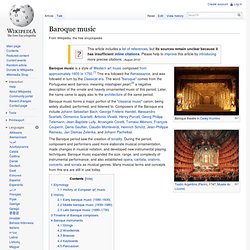
Composers of the Baroque era include Johann Sebastian Bach, George Frideric Handel, Alessandro Scarlatti, Domenico Scarlatti, Antonio Vivaldi, Henry Purcell, Georg Philipp Telemann, Jean-Baptiste Lully, Arcangelo Corelli, Tomaso Albinoni, François Couperin, Denis Gaultier, Claudio Monteverdi, Heinrich Schütz, Jean-Philippe Rameau, Jan Dismas Zelenka, and Johann Pachelbel. The Baroque period saw the creation of tonality. During the period, composers and performers used more elaborate musical ornamentation, made changes in musical notation, and developed new instrumental playing techniques. List of Baroque composers. Composers of the Baroque era, ordered by date of birth: Brief timeline[edit] Transition from Renaissance to Baroque (born 1500–49)[edit] Composers in the Renaissance/Baroque transitional era include the following (listed by their date of birth): Early Baroque era composers (born 1550–99)[edit] Composers of the Early Baroque era include the following figures listed by the probable or proven date of their birth:
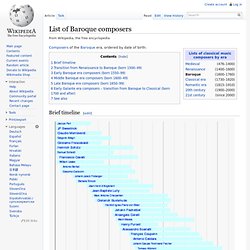
Henry Purcell. Henry Purcell (/ˈpɜrsəl/;[1] c. 10 September 1659[2] – 21 November 1695), was an English composer.
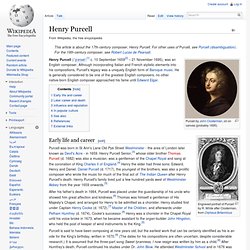
Although incorporating Italian and French stylistic elements into his compositions, Purcell's legacy was a uniquely English form of Baroque music. He is generally considered to be one of the greatest English composers; no other native-born English composer approached his fame until Edward Elgar. Early life and career[edit] Purcell is said to have been composing at nine years old, but the earliest work that can be certainly identified as his is an ode for the King's birthday, written in 1670.[9] (The dates for his compositions are often uncertain, despite considerable research.) It is assumed that the three-part song Sweet tyranness, I now resign was written by him as a child.[6] After Humfrey's death, Purcell continued his studies under Dr. Later career and death[edit] Purcell's manuscript copy of When on my sick bed I languish (c. 1680)
The Fairy Queen - Overture, by Henry Purcell. Johann Pachelbel. Pachelbel's autograph signature from his 1695 letter to Gotha city authorities Johann Pachelbel (German: [ˈjoːhan ˈpaxəlbɛl]; baptised September 1, 1653 – buried March 9, 1706)[1] was a German Baroque composer, organist and teacher who brought the south German organ tradition to its peak.
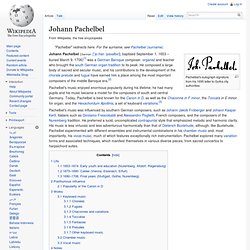
He composed a large body of sacred and secular music, and his contributions to the development of the chorale prelude and fugue have earned him a place among the most important composers of the middle Baroque era.[2] Soothing music(the best version) Antonio Vivaldi. Antonio Vivaldi in 1725 Many of his compositions were written for the female music ensemble of the Ospedale della Pietà, a home for abandoned children where Vivaldi had been employed from 1703 to 1715 and from 1723 to 1740.
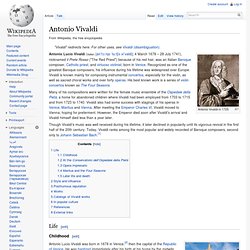
Vivaldi also had some success with stagings of his operas in Venice, Mantua and Vienna. After meeting the Emperor Charles VI, Vivaldi moved to Vienna, hoping for preferment. However, the Emperor died soon after Vivaldi's arrival and Vivaldi himself died less than a year later. Though Vivaldi's music was well received during his lifetime, it later declined in popularity until its vigorous revival in the first half of the 20th century. Vivaldi - Spring. Vivaldi - Spring. Antonio Vivaldi- The Four Seasons- Summer- Presto.
Johann Sebastian Bach. Bach's abilities as an organist were highly respected throughout Europe during his lifetime, although he was not widely recognised as a great composer until a revival of interest and performances of his music in the first half of the nineteenth century.
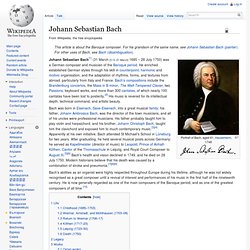
He is now generally regarded as one of the main composers of the Baroque period, and as one of the greatest composers of all time.[10] Life Childhood (1685–1703) At the age of 14, Bach, along with his older school friend George Erdmann, was awarded a choral scholarship to study at the prestigious St. Michael's School in Lüneburg in the Principality of Lüneburg.[19] Although it is not known for certain, the trip was likely taken mostly on foot.[18] His two years there were critical in exposing him to a wider facet of European culture. Air - Johann Sebastian Bach. J.S.Bach-Toccata e Fuga BWV 565-Karl Richter. Domenico Scarlatti. Life and career[edit] Domenico Scarlatti was born in Naples, Kingdom of Naples, in 1685, the same year as Johann Sebastian Bach and George Frideric Handel.
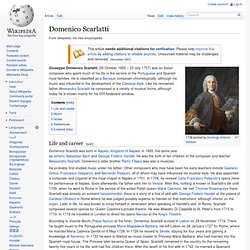
He was the sixth of ten children of the composer and teacher Alessandro Scarlatti. Domenico's older brother Pietro Filippo was also a musician. According to Vicente Bicchi (Papal Nuncio at the time), Domenico Scarlatti arrived in Lisbon on 29 November 1719. There he taught music to the Portuguese princess Maria Magdalena Barbara. Scarlatti befriended the castrato singer Farinelli, a fellow Neapolitan also enjoying royal patronage in Madrid. Music[edit] Only a small fraction of Scarlatti's compositions were published during his lifetime; Scarlatti himself seems to have overseen the publication in 1738 of the most famous collection, his 30 Essercizi ("Exercises"). The many sonatas which were unpublished during Scarlatti's lifetime have appeared in print irregularly in the two and a half centuries since.
Scarlatti - Sonata in d Minor k.517. Harpsichord Performance: Comparone Plays Scarlatti. Scarlatti Sonatas K 27 K 141 Scott Ross Harpsichord Clavicembalo. George Frideric Handel. George Frideric Handel (/ˈhændəl/;[1] German: Georg Friedrich Händel; German pronunciation: [ˈhɛndəl]; (1685-02-23)23 February 1685 – 14 April 1759(1759-04-14)) was a German-born Baroque composer famous for his operas, oratorios, anthems and organ concertos.
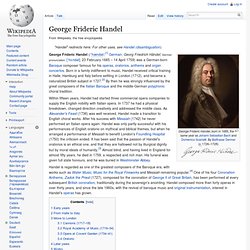
Born in a family indifferent to music, Handel received critical training in Halle, Hamburg and Italy before settling in London (1712), and became a naturalized British subject in 1727.[2] By then he was strongly influenced by the great composers of the Italian Baroque and the middle-German polyphonic choral tradition. Cecilia - bartoli lascia ch'io pianga händel rinaldo. Handel - Hallelujah.